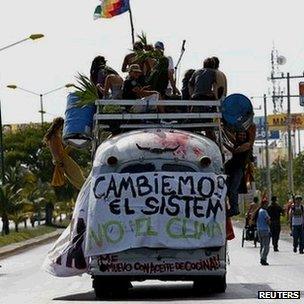Inside Mexico's climate revolution
- Published
- comments

Eric Luis Rubio Barthell, Nicolas Bellizia Aboaf and Porfirio Munoz Ledo - varied politics, but united here
Following a vote in its Senate on Thursday evening, Mexico is poised, external to become just the second country in the world to enshrine long-term climate targets into national legislation.
The margin of the vote was huge - 78-0 - indicating that all political parties have found common ground on this issue.
Now all that's needed is the signature of President Felipe Calderon, which is expected to materialise next week.
The bill enshrines a number of measures in law, including:
30% reduction in emission growth measured against a "business as usual" pathway by 2020, and 50% by 2050
35% of energy to come from renewable sources by 2024
obligation for government agencies to use renewables
establishment of a national mechanism for reporting on emissions in various sectors
The targets look pretty demanding at first sight - especially for a country where the population is growing and the economy expanding, and where oil makes a significant contribution to the national coffers.
So why is it taking steps that to the eyes of many will probably look like economic suicide?

Tlajomulco, on the outskirts of Guadalajara, recently saw a major oil pipeline fire
I had a chance to ask three Mexican parliamentarians recently when they came to London to look at how the UK, the first country in the world, external with this sort of national legislation, is doing it.
The views of Eric Luis Rubio Barthell, Nicolas Bellizia Aboaf and Porfirio Munoz Ledo were quite diverse - perhaps not surprising, as they come from different political parties.
"Mexico has a long tradition in multilateral politics," said Mr Munoz Ledo, a founder member of the centre-left Democratic Revolution Party (PRD) who now chairs the Foreign Affairs Commission.
That tradition re-asserted itself at the UN climate summit in Cancun in 2010, he said - and "this legislation is a strong commitment coming out of Cancun" to reflect that international commitment on climate change in national legislation.
For Mr Bellizia Aboaf, a member of the Institutional Revolutionary Party (PRI), which despite its name is considered more of a centrist party these days, it was more about practical issues.
"My state of Tabasco has suffered quite heavily the consequences of climate change," he said.
Low-lying Tabasco has traditionally suffered from flooding but the events of 2007, external, when water covered 80% of the state, were especially severe.
Yet Tabasco also has nearly 1,000 oil and gas wells in operation - a microcosm of Mexico in general, which is the sixth largest oil exporter in the world.
Traditionally, big hydrocarbon-producing countries have fought tooth and nail against action on climate change; and Mr Rubio Barthell, also of the PRI, said Middle Eastern oil-exporting countries have repeatedly asked Mexico to take this stance too.
But as the country has developed, oil and gas have become progressively less important to the economy as a whole.
That's why a more green economic vision makes sense for a number of politicians.
"I personally think this climate change topic should be an economic and energy issue, not an ecological issue, though I recognise that opinions are divided on this," said Mr Rubio Barthell.
And for Mr Munoz Ledo, the transition implied by a 35% renewable energy target is necessary and absolutely achievable.

The 2010 summit in Cancun put the UN climate convention's journey back on the road
"Mexico is aware this is the end of the oil era, so we need to implement this fiscal reform - and if we go through it, we'll be able to do without this oil," he said.
Solar energy, hydro-electricity, geothermal, biofuels and nuclear are options that are going to be explored.
The irony is, of course, that Mexico has traditionally been a younger and poorer cousin of the giant to its north, the United States, which has repeatedly declined to establish legislation of anything like this strength, citing impacts on economic growth.
"Power for the US is based on the army and energy and oil," Mr Munoz Ledo said.
"In 1989 you had [George] Bush senior coming into office from an oil background; if you go through Clinton and Obama, they serve the oil interest first.
"We're talking about the politics of neo-liberalism here which is based on oil interests and indebtedness - this is why so many in the US don't accept climate change, even though it's based on scientific evidence."
The three parliamentarians came to the UK to learn from its experience in setting up a robust carbon-curbing system, and pick up ideas.
Mr Bellizia Aboaf cited the Committee on Climate Change, external, which advises the government and monitors its actions, and the Carbon Trust that promotes low-carbon technologies, as bodies of interest, and also the UK experience with public-private funding models.
There are two big differences between the two nations' laws.
Firstly, as a developing country, Mexico isn't cutting emissions but cutting the rate at which they'll rise.
Secondly, it will require international financial support to deliver its targets - as is mandated in the UN climate convention, external.
The Cancun summit agreed to establish an international Green Climate Fund, external that is supposed to provide much of that support.
But some of its details have yet to be finalised, and it is a long way from receiving the huge sums of money it is supposed to receive - maybe $100bn a year by 2020 - so whether Mexico will get the support it needs is, for now, an open question.
Although Messrs Munoz Ledo, Rubio Barthell and Bellizia Aboaf appeared to find their London trip fruitful, I couldn't help feeling they were looking forward to getting back to the less frigid climes of Mexico, where solar power - as they remarked - seems a much more viable venture.